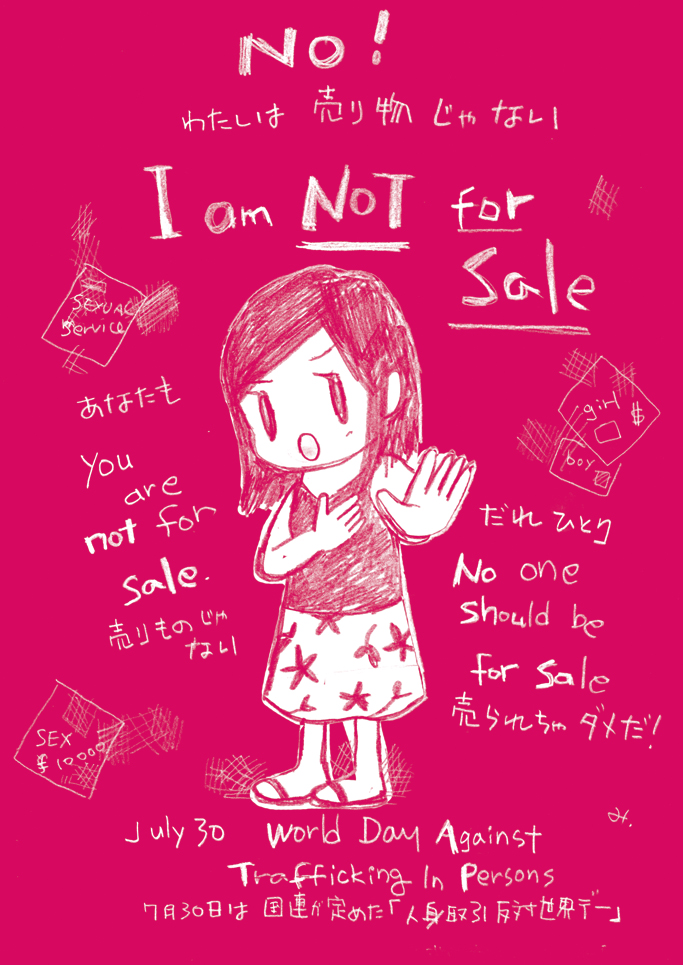“Human trafficking and modern-day slavery” …Doesn’t the phrase sound a little bit irrelevant to you? That they happened a long time ago or are happening in a faraway land?
But in truth, THEY ARE very relevant to us. Let us explain the four reasons why it is so.
 Illustration: Nanami Minami
Illustration: Nanami MinamiThe foreigners whom you see today may be exploited just like the above.
Are you familiar with the issue of forced participation in the pornographic videos (AV)? It is said that young women around 20 years old are targeted now. More accurately the phenomenon hidden for a long time is being revealed now as a result of NGO’s efforts and the women’s courage to speak up, rather than cases increasing. The characteristic of this particular kind of trafficking is tricking women by lies. Yes, it is fraud. Even if you think you are applying for a part-time job such as small modeling jobs (parts models, cut models, etc.), or just going with a scout who greets you on the street and wants you to hear their explanation, you are literally already trapped. They will do whatever they can to make you sign the contract. Even if you feel that something is wrong, after long hours of persuasion or being threatened by several men surrounding you, it is in fact impossible to say “no”. They will use the photocopies of your student ID or medical insurance ID to threaten you. After signing the contract, it is almost impossible to decline the job offer of pornographic videos because they will demand millions of yen in penalties. They are very sophisticated…they are professionals.
In adult videos, especially, once the scenes are videotaped, the data of the clip will remain for good on the internet. So, even if the sales are stopped by a court order, they remain forever on the internet or in someone’s computers, making the victims suffer for the rest of their lives.
These are examples of human trafficking where people are deceived and exploited. This year, the Japanese government finally recognized the dehumanization of human trafficking and began to take measures against it, but many victims are still being silenced.
For a well-known example, chocolate is made from cacao, 70% of which is produced in Ghana and the Ivory Coast in West Africa. In those two countries, there are many farms where young children are deprived of opportunities to go to school, scared by severe physical punishment and verbal abuse, forced to labor with almost no pay for long hours. The work on the farm is dangerous for children: climbing up tall trees, carrying heavy loads that weigh as much as 20 kg, and cracking cacao shells using big hatchet with bare hands.
In Thailand, male migrant workers from surrounding countries are tricked onto fishing boats and are forced to work in slave-like conditions without being able to go home for years. The fishing boats on the sea have no way to escape, no outside observers, and the threat to be thrown in the water which is very effective, so workers have to endure whatever harsh conditions they face. The seafood products that are caught in these conditions are later manufactured as canned food or fed for cultured prawns, and eventually sold in Europe, US, and Japan.
In Japan, many of the internship trainees who are exploited in slave-like conditions are working in the garment factories. Garment factories in Japan are under the pressure of low-price “fast fashion” abroad, so cannot pay much for workers. Your clothes or other textile products, even if they are made in Japan, cannot be guaranteed as “slave-free”.
The fourth reason why the issue is relevant to us is that each of us has keys to the solution. You may feel helpless to think that you can do nothing to stop the horrible things that are happening around the world. But as a matter of fact, we do have many ways to stop them.
First of all, this is what anybody can do: tell others. There are many people out there who do not know that the problems of human trafficking and modern day slavery exist. Even if they do know it, many of them would dismiss it as it has nothing to do with them. So, please let other people know via SNS like Twitter, Facebook, LINE, Instagram, etc. NFSJ has a Facebook Page (https://www.facebook.com/notforsalejapan/), so please “like” the page, then, you can receive and share the news and event information.
Buy fair trade goods. Sure, fair trade goods like chocolate or coffee are much more expensive than regular ones, so it would be difficult to buy them every time, but what about once in 5 times? If you find something with an extremely low price, think about it and ask yourself: ”Isn’t it too cheap?” “Does the person who manufactures it gets paid fairly?”
If you see someone in your neighborhood or know someone in your acquaintance that you may think may be a trafficking victim, you can seek advice from experts or tip the authority. If you feel it a little difficult to make contact yourself, let us know! (See the List of Contacts)
Learn about the issue and let others know about it by reading books (See the Booklist), writing a report at school, watching movies, organizing a screening event, hearing a lecture, etc. There are NGOs that are working to solve the human trafficking problems, so you can contribute by volunteering and donating to them
Yes, the power of each of us is small, but not insignificant. We all have something…each of us has some role to play! NFSJ’s activities
